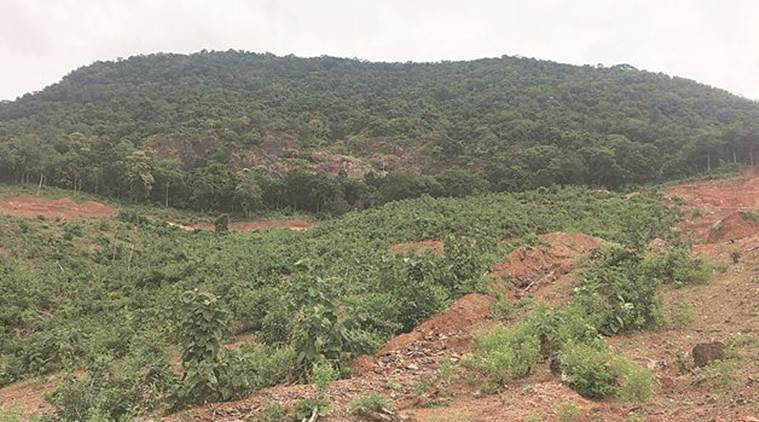- India
- International
Gadchiroli villagers fear losing forest, way of life and livelihood after former mining minister is re-elected
The villagers fear the mines will claim a historic temple built on the hills to commemorate the sacrifice of tribal freedom fighter Veer Baburao Shedmake.
 Surjagarh hill. Just days before the polls, Union Home Minister Amit Shah had said the Surjagarh mine would be reopened.
Surjagarh hill. Just days before the polls, Union Home Minister Amit Shah had said the Surjagarh mine would be reopened.
The unexpected victory of former minister Dharmaraobaba Atram in Gadchiroli’s Aheri constituency means only one thing to villagers in Etapalli taluka — the reopening of the Surjagarh mine.
Just days before the polls, Union Home Minister Amit Shah, on his first-ever visit to the Naxal-affected district, had announced his intention to restart iron ore mining operations. Addressing a rally in Alapalli town on his first visit to the Naxal-affected Gadchiroli district, Shah had said, “The Surjagarh mine which had been shut due to security concerns will soon open.” Those were Shah’s very first words on Gadchiroli’s proposed industrial and commercial development after he dispensed with the formalities of seeking the blessing of departed local heroes and legends.
But two hours away in Gatta village, the home minister’s announcement is yet another instance of the government leaving villagers out of its decision-making process, claim villagers. In 2007, the Maharashtra government had granted Mumbai-based Lloyds Metals and Energy Limited a 50-year lease to mine iron ore in the mineral-rich district. After it was allotted an area of 348.09 hectares, mining operations only began in 2016.
Over the years, however, the project has been the target of several Naxal attacks, with the banned CPI(Marxist) killing the firm’s vice president in 2013. Ever since, work was undertaken at the site under heavy police cover and suspended whenever intelligence of a Naxal attack was received.
Work finally came to a complete halt in January this year when a truck heading to the site collided with a state transport bus in Etapalli heading the other way, killing four local passengers. Irate villagers torched 15 trucks and vehicles owned by the firm, forcing operations to shut down.

The site is currently completely deserted, with a sole excavator parked around upturned earth. Other cranes and excavators are parked in safety outside Hedari police station, a few kilometres away from the site. While LMEL has not undertaken deep excavation on the hills and has thus far only transported rocks found on the surface, it will eventually conduct controlled explosions of the hills.
But even with the NCP’s victory by 15,458 votes over incumbent MLA Raje Ambarishrao Atram, who was tipped to retain his seat, local villagers are now resigned to losing their forest. The older Atram — Raje Ambarishrao’s uncle — was the state minister for geology and mining in the Congress-NCP government before his loss in the 2009 Assembly elections.
“Dharmaraobaba Atram was the one who proposed mining at Surjagarh. Now that he has been elected once more, he will definitely think of re-opening the mine at the earliest in spite of the opposition towards it,” says Lalsu Nagoti, a Madiya tribe leader who unsuccessfully contested the Aheri seat on a Vanchit Bahujan Aghadi ticket. The newly elected MLA did not respond to phone calls and messages seeking comment.
Surjagarh is just one of 14 sites spread over 40,000 hectares in Etapalli taluka where the state government has given its nod to private firms to mine iron ore. “More than 50,000 people living in 30-40 villages will be displaced once all the mines become operational. No one asked the gram sabha for its permission and there was no public hearing held to discuss the issue. Our rights under the Provisions of the Panchayats (Extension to the Scheduled Areas) Act and the Forest Act have been violated. There is no policy in place for the rehabilitation of those who will be displaced,” claims Sainu Gota, a zilla parishad member from Gatta village.
With the imminent resumption of mining activity, locals fear losing both their indigenous way of living and the source of their livelihoods. “Once the jungle goes, so will our means of earning a living. Each family here earns between Rs 40,000 and Rs 50,000 plucking tendu leaves during the season. Our rivers will be polluted and our fish will die. The pastures where we graze our animals will disappear and the dust from passing trucks and mining will destroy our crops. We have been protecting this land for centuries, It is not right to drive us out once the government finds iron,” Gota adds.
The villagers also apprehend that the mines will claim a historic temple built on the hills to commemorate the sacrifice of tribal freedom fighter Veer Baburao Shedmake. Villagers around the hills trek to the temple every January 6 and hold a fair there. He also dismisses claims by the government that the mines will generate jobs in the taluka. “None of the trucks heading to the mine have ever stopped at villages along the way. The mining company also brings labour from the outside,” Gota says.
He adds that letters sent to the District Collector, the Maharashtra CM, Maharashtra Governor and the President of India, protests and demonstrations have been to no avail. “Now that Amit Shah has announced the reopening of the Surjagarh mine, work will begin quickly. We will keep fighting and going to jail but there is not enough unity in the protest,” he says.
Nagoti fears that large-scale mining will come at a huge ecological cost to the district. “Gadchiroli will turn into Chhattisgarh where entire forests have been cut to mine iron ore and locals are in conflict with both the government and mining companies,” he claims.
Apr 24: Latest News
- 01
- 02
- 03
- 04
- 05







































